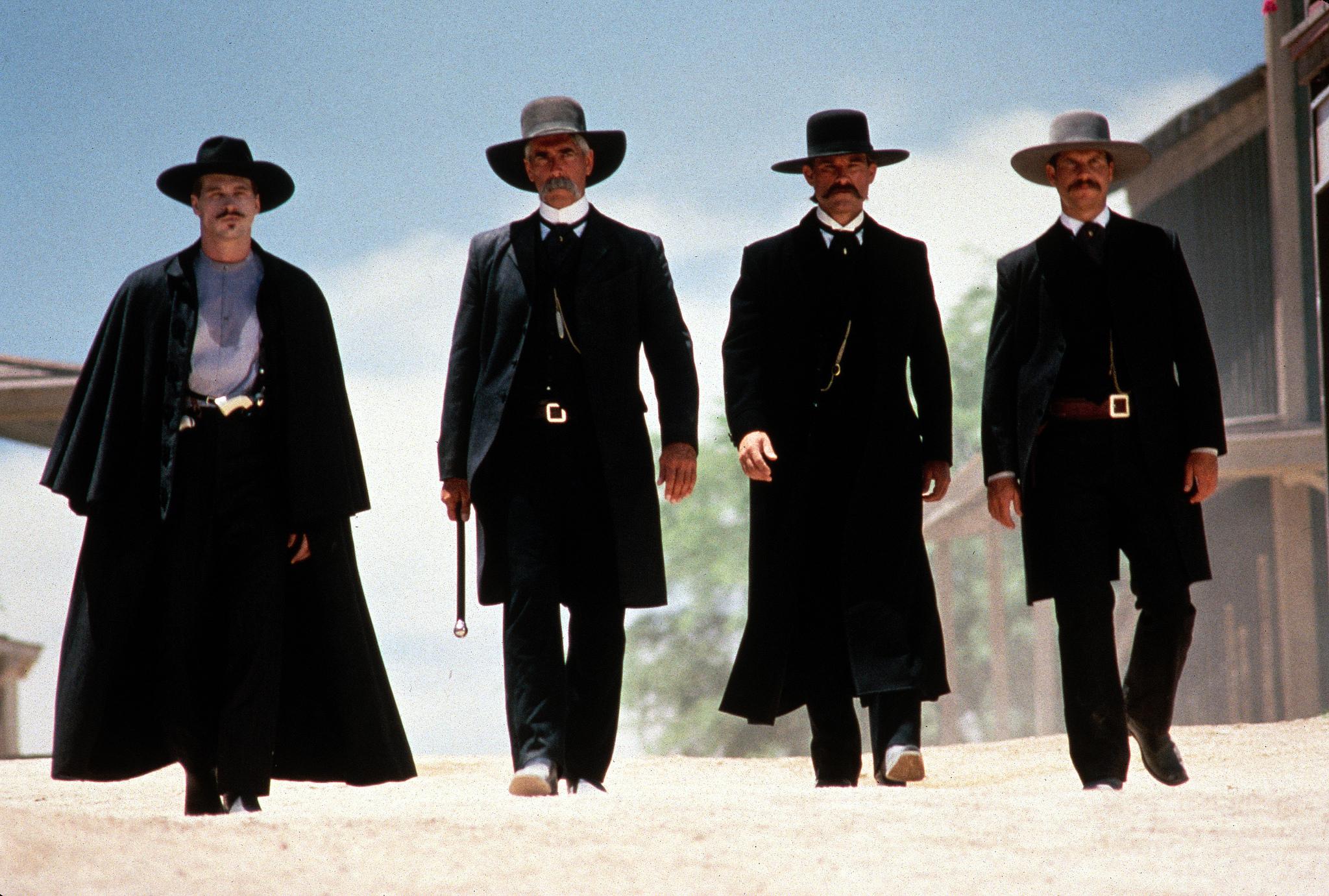Tombstone
Directed by Kevin Jarre, George P Cosmatos and Kurt Russell (uncredited)
Written by Kevin Jarre
US, 1993
It’s a strange phenomenon, considering just how much of Hollywood takes Western sensibilities and lends them to very different settings, but 1993’s cult movie Tombstone has the classic Western scenario, story and set up but without the same style and sensibility. Such has been the impact of the Spaghetti era inspired by Sergio Leone and, before then, the imprint of Glenn Ford and John Wayne, that very few incarnations since have taken a fresh perspective and approach to a timeless genre flick. Competing with the same story in a different take in the same, the Kevin Costner led Wyatt Earp, and troubled from the start by behind the scenes wrangles, it’s miraculous that this slice of pulp ever worked out.
The plot, despite at times appearing highly cinematic and over-the-top, is none-the-less surprisingly loyal to the true events surrounding retired lawman Wyatt Earp after he and his two brothers relocated to the town of Tombstone, Arizona in the 1880s. Wyatt (Kurt Russell), Virgil (Sam Elliott) and Morgan Earp (Bill Paxton) sell up their land and move to the prospering settlement with their families, intent on starting a peaceful new life. No sooner do they arrive, however, than they discover the insidious influence over the town by a group of outlaw bandits dubbed the ‘cowboys’. A ragtag group of criminals and gunslingers, the ‘cowboys’ and their ostensible leaders ‘Curly’ Bill Brocious (Powers Boothe) and Johnny Ringo (Michael Biehn) quickly clash with the Earps in a feud that sets the town on edge.
With the backing of the limited local law enforcement and vagabond close friend Doc Holliday (Val Kilmer), Wyatt mounts a campaign to clean up Tombstone and in the process sparks off a war that has fatal repercussions for all concerned. This is the tall tale which, among other things, was responsible for the OK Corral entering the cultural zeitgeist of American history and features countless renowned figures of the period, making it almost a Western equivalent to the Iliad. The scale of the story is clear from the execution and production history, with screenwriter and initial director Kevin Jarre’s treatment giving personal accounts to almost every character of significance in the story, while a stunning cast gives proceedings an epic flavor. Beyond the starring duo of Russell and Kilmer are the likes of Stephen Lang, Thomas Haden Church, Billy Bob Thornton, Lost’s Terry O’Quinn, Billy Zane and a cameo from Charlton Heston. Every scene is a delightful game of name spotting, and there’s even book end narration by the late great Robert Mitchum.
It’s this excitable edge of theatrical adventure that gives Tombstone it’s trump card, taking material which could easily have boiled down to dry historical point scoring and hamming it up to a hundred in a constantly moving, never dull rollercoaster complete with brilliant one liners, insults and action set pieces. Scenes such as Earp’s berserk dual pistol rage across a river bed monotonously shouting big no’s are so fabulously ridiculous and laughable that they became hugely endearing and strangely effective, more so when you discover that were at least partially based on real accounts. The same applies to the chaotic OK Corral shootout and Johnny Ringo’s final showdown. More often than not a scene comes across as almost disrespectful in its showboating until one reads into the history and sees it was based on logic defying fact.
While Kurt Russell is excellent heroic foil in the lead, showing great depth during his character’s romantic subplot with Dana Delany’s free-spirit theatre performer, the star of the show is Val Kilmer as the infamous and iconic Doc Holliday, a roaming gambler and world class gun slinger who’s unlikely bond with Earp forms the film’s emotional heart. As an actor, particularly during his early nineties pomp, Kilmer was one of the most infuriating performers around, capable of delivering brilliant and charismatic characterizations but just as often making missteps and slogging through less interesting parts on auto-pilot. Amusing and hypnotic as the pale but dashingly charming and rebellious Holliday, this is perhaps him at his best, funny when delivering brilliant witticisms one minute and undoubtedly badass when staring down crooks the next.
It’s clear that despite the problems the film faced, with Jarre fired early on and Russell having to direct the bulk of the film to keep the production from being shut down, the cast are having a merry old time with the scenery chewing material on hand and the result is some highly memorable turns from Sam Elliott, Powers Boothe and Michael Biehn. The latter is particularly impressive, one of his few A-list jaunts into purely villainous territory, and he makes the otherwise superfluous Johnny Ringo into a character of substance. An approach to the setting which relied on realism, with locations and costumes fine tuned for maximum authenticity, creates a distinctive look and tone and William A Fraker’s cinematography is appropriately lush in capturing the era.
Almost mercilessly entertaining, Tombstone may well be anti-Western in its style and attitude but this by no means should be seen as a negative, in the same manner that the best blockbuster action flicks know their limitations and ramp up their own virtues without pretension. One expecting Clint Eastwood-esque grizzled whispery monologues and long tracking shots across desert expanses will most definitely be disappointed by its more modern trappings and habits, but for sheer enjoyment level it provides plenty of solace and above all else, is a timeless guilty pleasure.
It may not be Unforgiven, but is surely forgivable by its plus points, namely just how darn fun it is.
Scott Patterson





